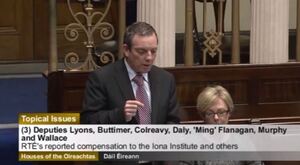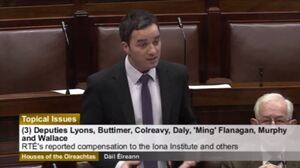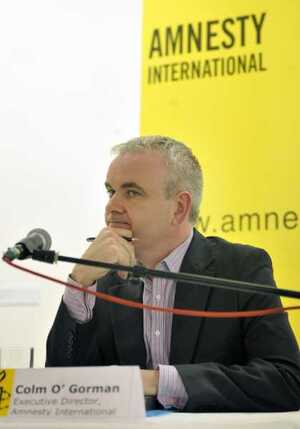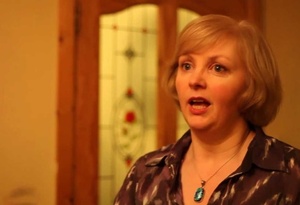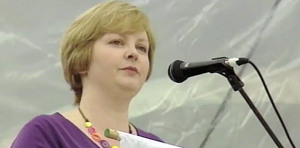[Fine Gael TDs Jerry Buttimer and Labour’s John Lyons, above]
During Topical Issues in the Dáil yesterday, several TDs, from different parties, expressed their concerns to Communications Minister Pat Rabbitte in relation to the €85,000 RTÉ paid to John Waters and members of the Iona Institute.
Minister Rabbitte responded saying he had “no role in managing editorial matters, making decisions around programming or dealing with litigation claims. I therefore have no intention of interfering in RTÉ’s management of this specific file.”
From the debate:
[Labour TD John Lyons]
“I want to ask some questions in relation to the issue for RTÉ to pay out a reported €85,000, in the time that I’ve left, I want to ask: was there one person in charge of this issue? One point of contact, from the moment that they decided to deal with this issue, until they paid out this compensation? And, on what decision did they decide to pay out this compensation? It’s quite clear Ceann Comhairle from the information I’ve received from various sources that, and including from the managing director in his own press release, where he says that the legal position was far from clear. Well the question I have for RTÉ, here today is, if the position was far from clear and they had various pieces of legal advice given to them over a number of weeks, stating basically that they shouldn’t pay to that they should pay, on what basis did they decide to pay this money out. Finally, Ceann Comhairle, cause I know I’m over time, what I want to say is, I know that the legal advice that RTÉ used, sought to pay out this money, is a privileged position and we are not entitled to it, but I believe there has to be a political will, in the interest of the national public, to find out on what basis they paid this out. Because I certainly believe that RTÉ were wrong to pay out this money on what was, essentially, an anti-gay prejudice issue that people were challenged on. Thank you, Ceann Comhairle.”
Later
“I really just want to say at this stage, because I actually have this one minute left, you know, there’s two people in here I think at the moment who knows what homophobia feels like, who knows what it’s like to be called a queer, to be called a fag, to be called a gay. Only recently, I think, just before Christmas, I walked from my own house, around the the Centra where a bunch of teenagers called me gay or some other name they call us, you know, I thought, you know I was living in a society where this stuff isn’t acceptable any more. But yet, when people challenge people on these issues and that’s what Rory O’Neill did on the Saturday Night Show: he called it what it is. When it walks like a duck, quacks like a duck, looks like a duck, it must be a duck. And I think RTÉ were completely wrong and bang out of order when they got numerous types of legal advice, saying in fact perhaps that they should not even pursue and give any sort of compensation out. RTÉ got it wrong and everybody in the public knows they got it wrong and RTÉ need to come out and let us know that they got it wrong. Otherwise there will not be confidence in our national broadcaster to mediate any debate with confidence, particularly around issues that affect my life and the people who love me and love all the other people who aren’t treated properly in this society”
[Fine Gael Jerry Buttimer]
“I do believe, minister, RTÉ were erroneous and were wrong in what they did. I think they folded too quickly and I would like to ask you, who advised, what was the nature of the advice? What was their intent in the advice in terms of their…why did they fold up tents so quickly and were they involved in any other organisations other than advising RTÉ? Our public service broadcaster has an obligation to provide balanced, responsible, fair transmission of social matters and social issues and it must also, as a public service broadcaster, facilitate fair and balanced debate on matters of absolute public importance. And central to this obligation, ceann comhairle, I believe must be an entitlement of those participating on programmes on RTÉ, to voice honestly-held opinions and make fair comment. RTÉ must act as a fair arbitrator and stand by the right of people on its platform, to voice honestly-held opinions, otherwise it acts to undermine its public service remit. And Ceann Comhairle, I contrast, the role of RTÉ in its duty in this case, with what happened in the Abbey Theatre a couple of weeks ago, where the whole issue of homophobia and the whole issue of LGBT rights was fully explored on the stage of the Abbey. Yet you contrast that with RTÉ, where it parked, at the first opportunity, a debate on this. What would happen if we were discussing racism? Would somebody who was accused of racism have to come on and defend themselves?”
Later
“Minister, RTÉ got it wrong, they got it completely wrong and they folder their tent in and in this house, this week Ceann Comhairle, in this Oireachtas, we were told, as gay people, that it’s a matter of social reengineering by the Gay Ideological Movement, and I’m quoting from a member in the Seanad. And Ceann Comhairle, let me put it on the record in this house, as I’ve done before. I speak here, not just as a gay person but as a member of society who wants to be treated equally. I’ve been beaten, spat, chased, harassed and mocked like Deputy Lyons because of who I am. I was born with a gift given to me and I’ve spent most of my life struggling and finding a place in my own country, which I love, to be accepted and to see the support from my fellow colleagues here in this house, and from you Ceann Comhairle is a demonstration of how our society is gone and come forward. But I will not, Ceann Comhairle, in a tolerant, respectful debate allow people who spout hatred, intolerance to be left go unchecked.”
[Sinn Féin TD Michael Colreavy]
“I could go into debate on what these people have said and written and how it could be identified as homophobic, however I’m willing to rely on Rory O’Neill and his alter ego, Panti, as the leading figure in Ireland’s LGBT movement, to know what homophobia is. I’m a straight, middle-aged man and I won’t pretend that I know how members of the LGBT movement are made to feel everyday when they face articles in newspapers, comments on the radio, abuse on the street and even accusations within the chambers of this institution but what I will discuss is RTÉ’s censorship of Rory O’Neill and the debate surrounding homophobia. The Government has promised a referendum on marriage equality in 2015, following a recommendation by a majority of the constitution convention, to amend the constitution, to allow same-sex marriage. Now, those who publicaly advocate an inequality cannot hide behind defamation legislation when they are called out on their views to seek to gain public support for. The demand of significant sums of public money by such individuals, or group, in place of a right to reply, sets a deeply worrying precedent. Now this country has a poor history of censorship. For many years, some of our great authors suffered at the hands of this censorship board. Section 31 kept republicans such as myself off the airwaves for many years. RTÉ has this tradition of facilitating censorship and as the public service broadcaster, it’s deeply worrying to see this rear it’s head again. It should not be the case that those who call homophobia out for what it is that should suffer the censorship.”
[United Left Alliance TD Clare Daly]
“I don’t know why RTÉ handed over money in this regard because nothing inaccurate was said and that is a critical point. The people and the organisation who benefited from this payout have clearly argued that LGBT people should be treated differently and that is nothing else, other than homophobia. And to call it anything else is in my opinion an abuse of language. Now Brendan O’Connor’s apology remarkably said that it is an important part of democratic debate, that people should be entitled to hold dissenting views on controversial subjects, and that is absolutely the case. But that means that you also have to have the right to express a different opinion on that dissenting view, and call it by it’s proper name and, as Deputy Buttimer said, if someone is known to be a racist, has expressed racist views and we call them a racist are we to then turn around and apologise for calling them by their right name. Now this issue has enormous consequences for Irish society and we, as a parliament, have to send a strong signal that we will not tolerate homophobia and unless this issue is addressed, the only conclusion that people will draw is that, if you have big pockets then you can use them to stifle debate and control opinion and Irish people don’t want to live in a society like that.”
[Independent TD Luke ‘Ming’ Flanagan]
“Hopefully, something good will come out of this. One good thing that has come out of it is that we get people like Michael Colreavy, or myself, from Leitrim, or from Roscommon, who can proudly stand up here and say we want to defend gay rights. Forty years ago, you’d have been worried going home if you did what Michael did here today. And that is massive progress, it really, really is. And the idea…it would be nice if there was no homophobia but pretending there isn’t doesn’t make it all go away. And that speech that was made in the Abbey Theatre explained it so beautifully and the fact that we’re all homophobic, we are. But it’s a case of working on it and trying to learn about the whole situation and fighting against it and, in the end, everyone gets their rights. But, sadly, some people are more homophobic than others and some people don’t seem to make any effort to deal with that homophobia and I think it’s sad that you’re now being denied the right to even use the word.”
[Independent TD Catherine Murphy]
“Ceann comhairle, for the last couple of weeks, some of us have thought we’ve been living in a parallel universe. A huge debate has been taking place online through sites like The Journal, Broadsheet, the Twitter and Facebook, the mainstream media, print media, largely, absent from that debate. The head of television, in RTÉ yesterday, explained to staff why they apologised and paid €85,000, that screams to me of discontent within RTÉ, it’s obvious that many of the station’s personnel know that there are times that defending the principles behind public service broadcasting ranks higher than the fear of litigation. John Waters, Breda O’Brien and the Iona Institute can all be described as opinion formers. They’ve made themselves part of the public discourse, I stress public discourse on such issues as same-sex marriage and frequently present gay people’s relationships as less then, as a starting point. For that to go, without challenge is about setting the parameters of the debate to their advantage and that’s at a time when we’re going to have a referendum next year and I think that that is, timewise, of critical importance. So why the rush by RTÉ to apologise and pay? Was it because they were aware of that those complaining had deep pockets and the ability to mount a credible legal challenge? If so, you must ask the question: how did those pockets get so filled? The second issue is: one of the people making complaints, one of the complaints that came was from John Waters who was then a board member of RTÉ’s regulating body, the BAI. Is it not a massive conflict of interest and was RTÉ under additional duress. Why did the BAI suddenly change their code of conduct on the 22nd of January, the day, the same day RTÉ agreed the payout? Is that the reason John Waters resigned from the BAI, on the 24th? Or did you, minister, ask him to resign? Given the massive payout and the obvious conflict of interest, minister, do you believe, as I do, that he should return that money to RTÉ?
[Independent TD Mick Wallace]
“I too watched Panti Bliss’s speech at the Abbey Theatre and it is powerful, it is very powerful. One would think that RTÉ had an obligation to facilitate free and open debate. In this instance it failed miserably, some people now more offended by the word ‘homophobia’ than they are by homophobia itself. This is censorship. In a press release last week, minister, you said that homophobia is too loaded a term to be used to categorise those who hold contrary views on what is a matter of legitimate public debate. I would like to point out that it is not for heterosexuals to define what homophobia is. We do not have the right to tell gay people what does or doesn’t constitute homophobia. This was eloquently summed up by Panti Bliss in her Abbey Theatre speech last weekend when she said ‘so now Irish gay people find ourselves in a ludicrous situation where not only are we not allowed to say publicaly what we feel oppressed by, we are not even allowed to think it because our definition has been disallowed by our betters. The word homophobia is no longer available to gay people, which is a spectacular, neat Orwellian trick because now it turns out that gay people are not the victims of homophobia, homophobes are’. Does the minister think that these contrary views, as he calls them, have no impact? Does he believe there is no link between discriminatory comments about gay people and physical attacks on gay people? Where does the minister think those that commit physical acts of violence against gay people get their ideas from. To quote Breda O’Brien ‘equality must take second place to the common good’. Does the minister honestly think these words have no impact on gay people?”


